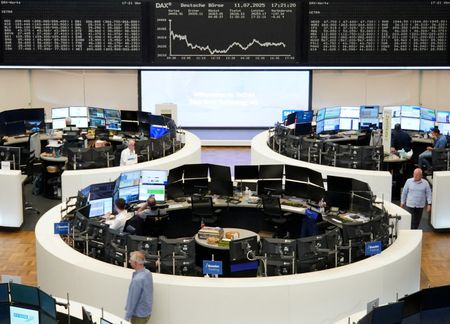By Nicole Jao
NEW YORK (Reuters) -Oil prices fell for the fourth consecutive session on Wednesday, as investors assessed a U.S. tariff deal with Japan ahead of trade talks between EU and U.S. officials due later in the day.
Brent crude futures were down 30 cents, or 0.44%, at $68.29 a barrel at 11:55 a.m. EDT (1555 GMT). U.S. West Texas Intermediate crude futures were down 28 cents, or 0.43%, at $65.03 per barrel.
Both benchmarks lost about 1% in the previous session after the EU said it was considering countermeasures against U.S. tariffs.
U.S. President Donald Trump said on Tuesday that the U.S. and Japan had struck a trade deal that lowers tariffs on auto imports and spares Tokyo from punishing new levies on other goods in exchange for a $550 billion package of U.S.-bound investment and loans.
“The slide (in prices) of the past three sessions appears to have abated but I don’t expect much of an upward impetus from news of the U.S.-Japan trade deal as the hurdles and delays being reported in talks with the EU and China will remain a drag on sentiment,” said Vandana Hari, founder of oil market analysis provider Vanda Insights.
The European Commission plans to submit counter-tariffs on 93 billion euros ($109 billion) of U.S. goods for approval to EU members, while the Commission’s primary focus is to achieve a negotiated outcome with the United States to avert 30% U.S. tariffs.
European Trade Commissioner Maros Sefcovic will speak with U.S. Commerce Secretary Howard Lutnick from Brussels on Wednesday afternoon, before Commission officials brief EU ambassadors on the state of play.
OIL PARES LOSSES
Oil pared some losses after U.S. Energy Information Administration data showed U.S. crude inventories fell last week by 3.2 million barrels to 419 million barrels, compared with analysts’ expectations in a Reuters poll for a 1.6 million-barrel draw.
“That’s a bullish swing,” said Bob Yawger, director of energy futures at Mizuho. “It was largely a function of import-export dynamics.”
U.S. crude exports were up by 337,000 barrels per day (bpd) to 3.86 million bpd, while net U.S. crude imports fell last week by 740,000 barrels per day, the EIA said.
In another bullish sign for the crude market, the U.S. energy secretary said on Tuesday that the U.S. would consider sanctioning Russian oil to end the war in Ukraine.
The EU on Friday agreed its 18th sanctions package against Russia, lowering the price cap for Russian crude.
On the physical supply side, Azeri BTC crude loadings from the Turkish port of Ceyhan resumed on Wednesday after a delay of several days caused by increased checks for chloride contamination, several industry sources told Reuters.
(Reporting by Nicole Jao in New York, Enes Tunagur ın London, Mohi Narayan in New Delhi, additional reporting by Colleen Howe in Beijing; Editing by Edwina Gibbs, Bernadette Baum and Ed Osmond)










